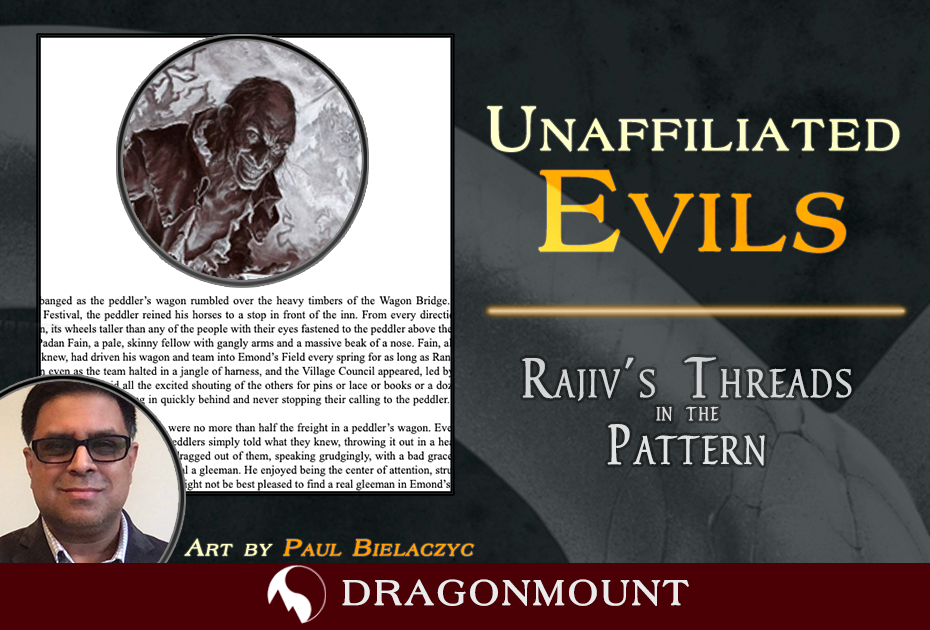
Rajiv Moté is Dragonmount's book blogger with a lens on the craft of fiction writing. When he's not managing software engineers, he writes fiction of his own, which can be found cataloged at his website.
The Dark One is the source of evil in The Wheel of Time, and his army of monsters is formidable. Hulking man/beast soldiers, eyeless swordsmen, soul-sucking bat-men, unnoticeable assassins, evil hounds, Power-resistant gumbies, giant worms, and the giant insects they become. But the scariest monsters in the saga are creatures without a direct link to the Dark One, unaffiliated evils who haunt the corners of the Pattern, with nefarious purposes beyond the battle between the Dark One and the Dragon. Let’s look at five of them.
Shadar Logoth
“Suspicion and hate had given birth to something that fed on that which created it, something locked in the bedrock on which the city stood. Mashadar waits still, hungering.”
“Shadows Waiting”, The Eye of the World
Shadar Logoth is the name of a haunted city, but also of a triumvirate monster composed of ghosts, a mist creature called Mashadar, and a corrupting taint. Its evil has a complex and murky history, but its origin is human. It was initially kindled by people’s paranoia and ruthlessness against the Dark One. In some ways, it is like an echo of the Dark One himself, trapped in the prison of Shadar Logoth at the moment of its creation, needing human action to escape and touch the world with its corruption. But its evil “vibrates” at an opposite frequency to the Dark One’s, a pivotal piece of natural philosophy that caused Rand al’Thor’s wounds from the ruby-capped dagger and Ba’alzamon’s staff to war against each other instead of destroying him, and inspired Rand to cleanse the Dark One’s taint on saidin.
Though there are invisible watchers and the ghostly counselor Mordeth himself haunting Shadar Logoth, the evil manifests as Mashadar, a mindless, chthonic monster emerging from deep in the earth only at night, blindly seeking prey with its misty tentacles. Shadar Logoth is one of the scariest parts of The Wheel of Time, the place where Robert Jordan unleashed the horror-writing chops he hinted at in the dream-scenes with Ba’alzamon. But the monster’s human origins make it fascinating, and Robert Jordan’s cosmology more complex. Whatever the glossary says, the Dark One is not the source of evil in The Wheel of Time, or at least not the sole source. Evil comes from people’s hearts, and when it is sufficiently strong, it can manifest monstrously. Perhaps the Dark One himself was created by humans in the infinite turnings of the Wheel.
Machin Shin
“Something left from the Time of Madness, perhaps,” Moiraine replied. “Or even from the War of the Shadow, the War of Power. Something hiding in the Ways so long it can no longer get out. No one, not even among the Ogier, knows how far the Ways run, or how deep. It could even be something of the Ways themselves. As Loial said, the Ways are living things, and all living things have parasites. Perhaps even a creature of the corruption itself, something born of the decay. Something that hates life and light.”
“What Follows in Shadow”, The Eye of the World
The Black Wind could be a creature of the Dark One in the way the creatures of the Blight are: a product of the Dark One’s taint. But it seems to be a chthonic monster more similar to the evil of Shadar Logoth than the Dark One, a collection of voices confined to its domain, and happily gobbling up Shadowspawn as readily as any other intruder. Moiraine makes the likeness between Shadar Logoth’s evil and Machin Shin explicit when she describes the Mordeth-possessed Padan Fain’s encounter with it.
“The Black Wind caught him--and he claimed to understand the voices. Some greeted him as like to them; others feared him. No sooner did the Wind envelop Fain than it fled.”
“More Tales of the Wheel”, The Eye of the World
Machin Shin and the Ways are another wonderfully creepy horror flex by Robert Jordan, and it’s a shame that the in-canon conclusion of the series wasn’t able to resolve its threat. Out of canon, at least we have “A Fire Within the Ways,” a deleted chapter from A Memory of Light (jointly credited to Robert Jordan and Brandon Sanderson) appearing in the Unfettered III anthology. In it, Perrin leads a mission to disrupt the Dark One’s armies from using the Ways, and at the climax of the battle, Machin Shin attacks. Neither weapons nor the One Power harm it, but then they hear a pure rumble of Ogier voices raised in song. Something in the song allows the Asha’man and Aes Sedai to channel bright, uncorrupted light, and Machin Shin is driven back into the shadows.
If the evil of Shadar Logoth seemed like a primitive prototype of the Dark One in miniature, bound in its prison and reaching the world through human proxies, Machin Shin mirrors him in other ways. It is a formless but sentient evil that exists outside of the Pattern, known only because the Aes Sedai reached into the liminal space where it lurks.
Hinderstap’s Ghosts
“The road’s length squirmed with shadows, figures battling, screeching, struggling in the deepening gloom. In that darkness, the fights looked at times to be solid, single creatures--horrific monstrosities with a dozen waving limbs and a hundred mouths to scream from the blackness.”
“Night in Hinderstap”, The Gathering Storm
By day, the people of Hinderstap are welcoming, but they insist that visitors leave before nightfall. Because night is when the entire town goes murderously insane, and everyone fights each other to the death. By morning, they all wake up in their beds, fully healed, with no memory of the night’s carnage. Any outsider unlucky enough to be killed in the madness joins the cycle of violence, forever.
Hinderstap is an eldritch stopover that doesn’t seem to be connected to anything else in the saga, though it has a fun payoff during the Last Battle. The chapter icon suggests that what’s happening in Hinderstap is a result of the Pattern unraveling. But we’ve seen these localized, nocturnal curses before, and the above description tickles a memory.
“The waving gray tentacles of Mashadar blocked half the street, and the Trollocs were balking… The thickening tentacles of fog swung uncertainly for a moment, then struck like vipers… There was no sound from that cry, any more than from the Trollocs, but something came through, a piercing whine just beyond hearing, like all the hornets in the world, digging into Rand’s ears with all the fear that could exist.”
“Dust on the Wind”, The Eye of the World
Perhaps there was another deleted chapter in which Mordeth, in Padan Fain’s body, spent some time in Hinderstap, leaving his corrupting influence to seep into the bedrock. Certainly one can imagine that the nightly carnage in Hinderstap had some analogue in Aridhol at first, and over the centuries its undying people became little more than mist and shadowy watchers.
The Aelfinn and the Eelfinn
“The game is a remembrance of old dealings. It does not matter so long as you stay away from the Aelfinn and the Eelfinn. They are not evil the way the Shadow is evil, yet they are so different from humankind they might as well be. They are not to be trusted, archer. Stay clear of the Tower of Ghenjei.”
“To the Tower of Ghenjei”, The Shadow Rising
The Aelfinn (the “snake people”) and the Eelfinn (the “fox people”) are ancient folk who live in a different, geometry-bending world called Sindhol, accessible only through ter’angreal portals and the mysterious Tower of Ghenjei. They share similarities with genies and fae, granting wishes (if not always in the ways hoped for) and imparting truths (while exacting a price). They also feed on memories and sensations, and can watch the world through the eyes of those they’ve touched. If Shadar Logoth and the Ways gives readers a dip into chthonic horror, Sindhol is a foray into dark fairy tales. The Aelfinn and the Eelfinn even seem to share an origin with a creature in a Neil Gaiman story.
“‘And what do you take, for the gold you give them?’
Little enough, for my needs are few, and I am old; too old to follow my sisters into the West. I taste their pleasure and their joy. I feed, a little, feed on what they do not need and do not value. A taste of heart, a lick and a nibble of their fine consciences, a sliver of soul. And in return a fragment of me leaves this cave with them and gazes out at the world through their eyes, sees what they see until their lives are done and I take back what is mine.”
“The Truth Is a Cave In the Black Mountains”, Neil Gaiman
The ’finns are the perfect foil for Mat. While Rand contends with the political machinations of the lands he tries to unite, Mat plays a game against inhuman creatures with unfathomable desires. He has to discover the rules as he plays, the stakes are staggeringly high, and the only way to win is to cheat. Who better to take them on, than the Wheel’s trickster figure? Instead of being armed with prophecy and ta’veren destiny, Mat’s rescue mission is armed with folklore, lessons from a children’s game, and pure luck. Fortunately, Mat is the luckiest man alive.
The Children of the Light
“There are a lot of men coming, on horses. They came up behind the wolves, but the men didn’t see them… But Dapple says… Dapple says they smell wrong. It’s… sort of the way a rabid dog smells wrong.”
“Children of Shadow”, The Eye of the World
Shortly after the War of Power that sealed the Dark One and (most of) the Forsaken in their prison at Shayol Ghul, there were angry men who decided to take “justice” into their own hands. They rooted out and punished people they believed served the Forsaken. Their spiritual successors became the Children of the Light, dedicated to finding and destroying Darkfriends wherever they may be.
The Whitecloaks are so fanatical (even before encountering Mordeth’s corruption) that, to wolves, they smell rabid. They see improper respect paid to them, or casual association with Tar Valon, the Power, or anything unexplained, to be proof of being a Darkfriend. Their Questioners seem modeled on the Spanish Inquisition. They’re bigots and bullies, so convinced of their own righteousness that they’re willing to cross any line to accomplish their goals.
If the evil of Shadar Logoth was human in origin, the Children of Light show that the same evil remains alive and well in humanity itself. It’s the most mundane evil in The Wheel of Time, but the most pervasive, persistent, and real. They embody what William Butler Yeats described in his apocalyptic poem “The Second Coming” with “The best lack all conviction, while the worst are full of passionate intensity.” The Fourth Age has cleared the field of many dangerous foes, but the danger of people like the Whitecloaks is always with us. Rand al’Thor remade the world to preserve human free will, which is why the struggle against the Shadow will continue forever, even if the Dark One is locked back in his prison.
What’s your choice of scariest monster from The Wheel of Time?












Recommended Comments
There are no comments to display.
Join the conversation
You can post now and register later. If you have an account, sign in now to post with your account.
Note: Your post will require moderator approval before it will be visible.